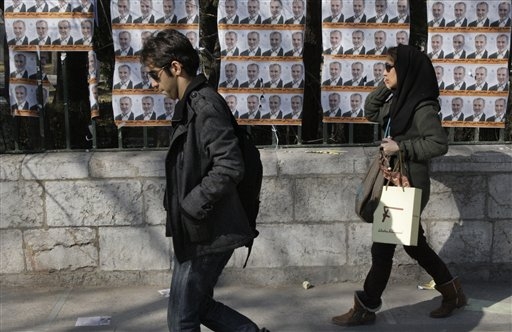
TEHRAN, Iran (AP) — Iran's hard-liners have been so effective at crushing the opposition, they now are left brawling among themselves.
That's the messy political scramble in this week's parliamentary elections — the first major voting since the disputed re-election of President Mahmoud Ahmadinejad in June 2009 and the mass protests, chaos and crackdowns that followed.
The balloting on Friday will amount to a popularity contest among various conservative factions, which were once united against reformists and are now sniping at each other and picking sides in the power struggle between Ahmadinejad and his opponents within the ruling Islamic theocracy.
The outcome, too, could resonate well beyond the 290-seat parliament.
In many ways, it may determine whether Ahmadinejad is politically spent or still able to exert influence over elections next year to pick his successor, who will become Iran's new international face and inherit challenges that are now hard to predict. The West still favors economic sanctions as the best tool to rein in Iran's disputed nuclear program, but Israel says a military strike could be necessary if Tehran refuses to ease its defiance.
"This election is a test of strength for the groups still standing after the crackdowns," said Salman Shaikh, director of The Brookings Doha Center in Qatar. "The reformists are out of the picture. Ahmadinejad has been under attack. The question then becomes: Can he get a second wind out of this?"
On a broad level, Iran's political infighting has created a lot of noise without making any fundamental changes in how the country is ruled.
The grip of Supreme Leader Ayatollah Ali Khamenei and the protectors of the ruling system remains as strong as ever. They control all key appointments and policies — including nuclear and defense — while vetting every candidate for president and parliament. Elected officials are allowed some leeway, yet always with the understanding that the clerics at the top can reverse any decision.
"It's a political show. Elections make sense when they bring change. No change will happen after Friday's vote," said Sadeq Zibakalam, a Tehran University professor and a liberal-leaning political analyst.
But the political discord points to internal tensions that could spill into critical issues, such as the direction of Iran's nuclear program or possible attempts at diplomatic overtures with Washington. The U.S. and allies fear Iran's uranium enrichment could lead to the development of atomic weapons. Tehran insists it only seeks reactors for energy and medical research.
Ahmadinejad, meanwhile, has been left politically wounded after daring to challenge Khamenei's authority.
The president first pushed back against Khamenei's decision in April to reinstate the intelligence minister, Heidar Moslehi, who had been dismissed by Ahmadinejad. The ruling clerics struck hard.
Dozens of Ahmadinejad aides were arrested or driven into the political margins. Hard-line media also began to smear Ahmadinejad's confidant, Esfandiar Rahim Mashaei, as head of a "deviant current" that sought to undermine Islamic rule. Some critics even claimed that Mashaei conjured black magic spells to befuddle Ahmadinejad's mind.
Earlier this month, lawmakers summoned Ahmadinejad for questioning over a long list of issues, including alleged mismanagement of the economy and his public snubs of Khamenei. The order — which should be carried out by the new parliament — was the first such action taken against an Iranian president since the 1979 Islamic Revolution.
The parliamentary elections are effectively a referendum on the feuds.
An array of conservative splinter blocs have emerged. All share the same anti-reform agenda, but differ in their views on the internal political skirmishes.
Some are hard-line Khamenei loyalists who want to further punish Ahmadinejad and his allies. Others back Ahmadinejad, whose supporters have been campaigning aggressively in rural and poor areas with promises of more government handouts. Still other candidates occupy some kind of middle ground.
The staunch Khamenei group, known as Motahed, or United Front, is expected to do well on Friday. But a pro-Ahmadinejad bloc, called Paidari, or Resistance Front, also appears confident.
If Ahmadinejad's allies can make gains in the new parliament — now strongly in the hands of his political foes — it would send a message to the ruling clerics that he has not been neutralized and can still try to get a protege on the presidential ballot in 2013.
That may be the only drama left for next year's race.
The ruling clerics are almost certain to veto the candidacy of anyone with even a faint hint of reformist sentiment. For the parliamentary elections, some independents were allowed among the more than 3,200 candidates. But the approval came only after they distanced themselves from the groups that led protests after claims of vote rigging in the 2009 election.
The main opposition groups have been beaten down by relentless arrests and pressures, including the once-powerful Green Movement. Its leaders, Mir Hossein Mousavi and Mahdi Karroubi, have been under apparent house arrest for more than a year.
On Monday, the rights group Amnesty International criticized Iran's "repression in law and practice" such as using courts to ban opposition groups and waging efforts to block reformist media and websites.
With major reformist factions absent from the upcoming elections, authorities are appealing for a strong turnout to overshadow the expected boycott by opposition supporters. Iran's state TV has devoted most its programs to Friday's elections, urging voters to "disappoint the enemy."
"Friday's vote will be one of the most important elections," claimed Hamid Rasaei, a hardline lawmaker seeking re-election. "It will be very influential."